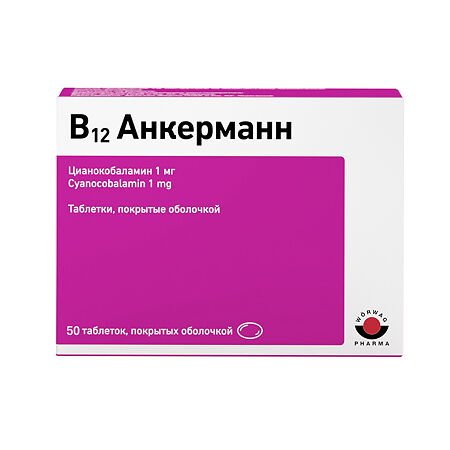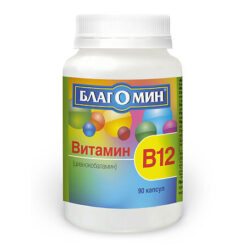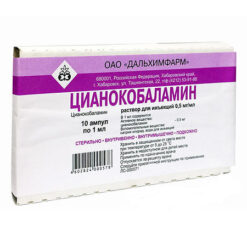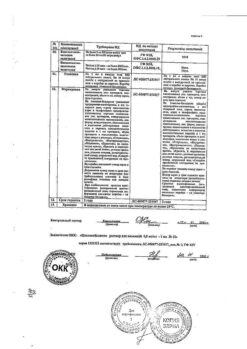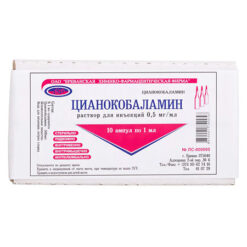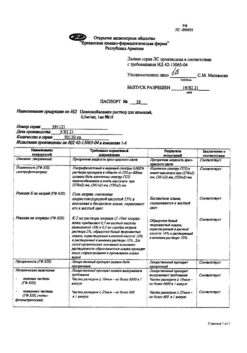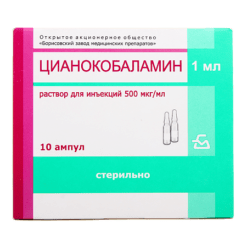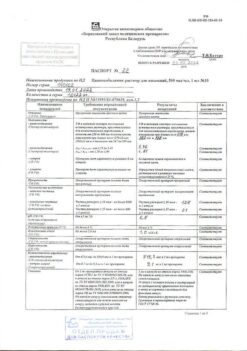No products in the cart.
B12 Anckermann, 1 mg 50 pcs
€27.09 €22.57
Description
Pharmacotherapeutic group: anti-anemic drugs, vitamin B12 (cyanocobalamin and its analogues), cyanocobalamin.
ATC code: B03BA01
Vitamin B12 is part of the methylmalonyl-coenzyme A isomerase prosthetic group, necessary to convert propionic acid to succinic acid. In addition, vitamin B12 along with folic acid participates in the formation of labile methyl groups, which are transferred to other methylacceptor proteins via transmethylation processes. Vitamin B12 influences nucleic acid synthesis, especially in the processes of hematopoiesis and cell maturation in general.
Therapeutically, vitamin B12 is used as cyanocobalamin, and/or hydroxocobalamin or hydroxoacetate. All of these forms are prodrugs that are converted in the body to the active forms, methylcobalamin and 5-adenosylcobalamin.
In the human body, vitamin B12 is not synthesized and comes only with food. Vitamin B12 is rich in liver, kidney, heart, fish, oysters, milk, egg yolk and meat. Vitamin B12 is absorbed mainly in the small intestine. Two mechanisms of absorption are known: an active pathway in which vitamin B12 binds to an internal factor (a glycoprotein formed in the stomach), after which absorption occurs, and a passive pathway that provides absorption of high doses of orally ingested vitamin B12 in case of a lack of internal factor. Vitamin B12 is stored in the body only in the amount needed to meet daily requirements, which is about 1 mcg.
Signs of deficiency
Decreased or absent absorption of vitamin B12 with food, which can exist for several years, leads to clinical symptoms if its plasma levels fall below 200 pg/mL. The hematologic manifestation of the deficiency is megaloblastic anemia. The neurologic manifestation of vitamin B12 deficiency is disorders of the peripheral and central nervous system. Polyneuropathy phenomena may be accompanied by damage to the posterior columns of the spinal cord and combined with psychological disturbances. Early signs of deficiency may be non-specific symptoms, such as weakness, pallor, paresthesias of the hands and feet, gait disturbances, and decreased physical strength.
The symptoms caused by vitamin B12 deficiency can be corrected by vitamin B12 supplementation alone. When high oral doses (1 mg/day or more) are given, remission can be achieved and successful maintenance therapy for symptoms associated with vitamin B12 deficiency is provided.
The absorption of vitamin B12 occurs in two ways:
- active absorption in the 12-pericardium and small intestine in a bound state with internal Castle factor. Subsequent entry of vitamin B12 into tissues is by transcobalamin belonging to the group of plasma beta-globulins.
- The entry of vitamin B12 into the bloodstream is independent of the internal factor by passive diffusion through the mucosa of the gastrointestinal tract. Approximately 1-3% of orally ingested vitamin B12 enters the systemic bloodstream in a linear dose-dependent manner. Thus, when high doses (1 mg/day or more) are taken, sufficient absorption occurs even in patients with no intrinsic factor.
When vitamin B12 requirements exceed physiologic values (10 mcg/day), passive absorption of vitamin B12 not related to the internal factor is increasingly important (Table 1).
Table 1. Amount of absorbed vitamin B12 as a function of dose.
| The amount of absorbed vitamin B12 (µg) | |||
.Total | Active < | Passive | ||
10 | 1.38 | 1.3 | 0.08 | |
100 | 2.365 | 1.477 | 0.887 | |
1000 | 10,484 | 1,498 | 8,99 | |
10000 | 91,486 | 1,499 | 89,986 | |
The total amount of absorbed vitamin B12 in absolute terms increases with increasing dose.
The main place of deposition of vitamin B12 is the liver. The amount of vitamin B12 used by the body to supply the daily requirement is extremely low at about 1 mcg, with a metabolic rate of 2.5 mcg. The biological half-life is about 1 year, so the body uses about 2.55 mcg of vitamin B12 per day, or 0.051% of the total vitamin supply in the body.
Vitamin B12 is excreted primarily with bile, and up to 1 µg is reabsorbed by the enterohepatic route. If due to the use of high doses, especially after parenteral administration, the intake of vitamin B12 exceeds the body’s ability to accumulate it, the excess is excreted in the urine.
When insufficient intake of vitamin B12 by a healthy body, a critical level develops after 3-5 years, manifested by signs of vitamin B12 deficiency.
Preclinical Safety Data
In preclinical animal studies, there were no signs of toxicity even when administered at high doses. There were no adverse effects of vitamin B12 on pre- and postnatal development when used in male and female animals and no teratogenic, mutagenic or carcinogenic effects.
Form of release
Form of release
25 tablets in a blister made of PVC/PVDC film and aluminum foil, 2 (No. 50 (25×2)) or 4 (No. 100 (25×4)) blisters along with an insert in a cardboard box
Additional information
| Shelf life | 3 years. |
|---|---|
| Conditions of storage | Store at a temperature not exceeding 25 ° C. |
| Manufacturer | Artesan Pharma GmbH & Co. KG, Germany |
| Medication form | pills |
| Brand | Artesan Pharma GmbH & Co. KG |
Other forms…
Related products
Buy B12 Anckermann, 1 mg 50 pcs with delivery to USA, UK, Europe and over 120 other countries.

